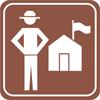Watch for Humorous and Informative Outdoor Tips with our own Expert from the Hills.
Learn about Hypothermia--A Silent Killer
Outdoor enthusiasts, caught in the high country during a cold snap, know from experience that fall weather can rapidly change from warm late summer weather to mid-winter blizzard conditions. Although fall can provide many enjoyable recreational activities, a silent killer often lurks in the background--hypothermia.
Hypothermia is a condition that occurs when body temperatures drop below normal, often due to exhaustion or exposure to the elements. Trouble usually occurs when the body loses heat faster than the body can produce it. As the core body temperature drops, the following symptoms occur (provided by Wilderness Medicine, William. Forgey, M.D.):
* 99 -97 F: Normal body temperature; Shivering may occur.
* 97 -95 F: Goose bumps; Shivering can range from mild to severe; unable to perform complex tasks with hands; skin becomes numb.
* 95 -93 F: Intense shivering; muscles become very uncoordinated; movements become slow; stumbling pace; mild confusion; Unable to walk a 30 ft line properly--THE BEST FIELD TEST OF HYPOTHERMIA.
* 93 -90 F: Violent shivering persists; difficulty speaking; sluggish thinking and amnesia; frequent stumbling; signs of depression.
* 90 -86 F: Shivering stops; blue and puffy exposed skin; confusion; inability to walk; very poor coordination; irrational behavior, BUT MAY BE ABLE TO MAINTAIN POSTURE AND APPEARANCE OF PSYCHOLOGICAL CONTACT.
* 86 -82 F: Severely rigid muscles; semiconscious; loss of psychological contact; slow pulse and respiration; dilated pupils.
* 82 -78 F: Unconsciousness; erratic heart beat and respiration; muscle tendon reflexes cease; heart beat may be inapparent.
* 78 -75 F: Failure of cardiac and respiratory centers; probable death: DEATH MAY OCCUR BEFORE THIS LEVEL.
Although hypothermia can easily occur in bitter cold conditions, it most often attacks between 30 and 80 degree temperatures, as energy is lost from the body. Outdoor recreationists need to be aware of the previously listed conditions to treat hypothermia before it becomes severe. Many victims often do not realize the existing threat until it is almost too late. Dr. Glenn R. McGettigan explains how individuals can avoid hypothermia and treat victims.
Eat properly and often. Whenever you are in camp, take advantage of the available food to fuel the body and maintain it's normal temperatures. Avoid the idea that you will eat a big meal in the evening. It may be too late by then. Get sufficient rest and avoid alcohol, which interferes with the body's thermostat.
Dress with several layers. Layers trap air, which provide greater insulation from surrounding temperatures. Many layers usually provide better insulation than one "heavy coat" and also allow the recreationist to remove layers as temperatures rise.
Listen to our Programming
You can find Backcountry Utah on several fine stations throughout Utah. To find a station near you, visit the Network site
Listen to our Drivetime Segments
KTMP 1340 AM in Heber
Weekdays
7:55 a.m. and 3:55 p.m.
KOAL 750 AM in Price
Weekdays
7:30 a.m. and 4:30 p.m.
KCYN 97.1 FM in Moab
Weekdays
8:40 a.m. and 4:50 p.m
KCPX 1490 AM in Spanish Valley
Weekdays 7:40 a.m. and 4:40 p.m.
Listen to the Weekend Edition
KTKK 630 AM in Salt Lake City, Ogden and Provo
Saturday Mornings 10 a.m.-11 a.m.







